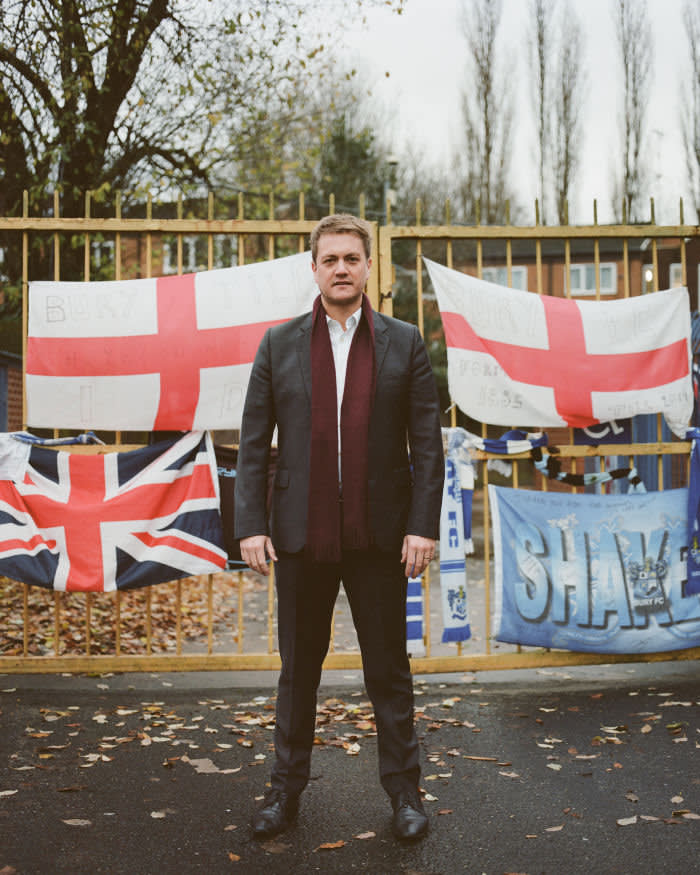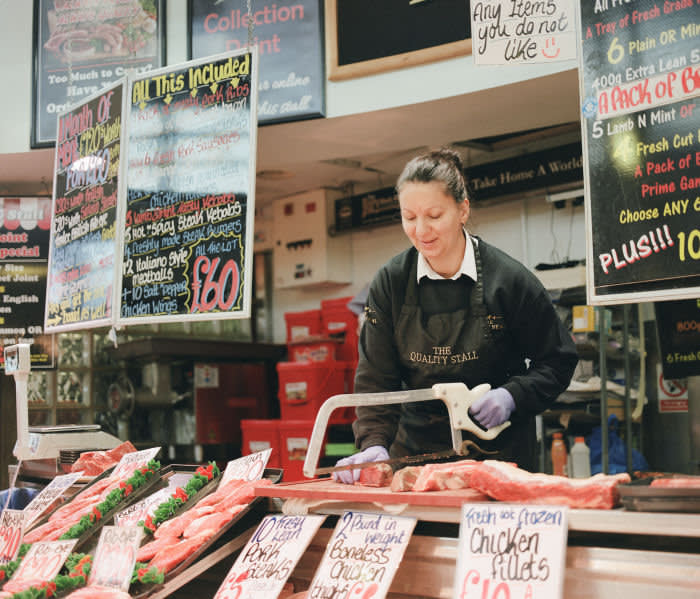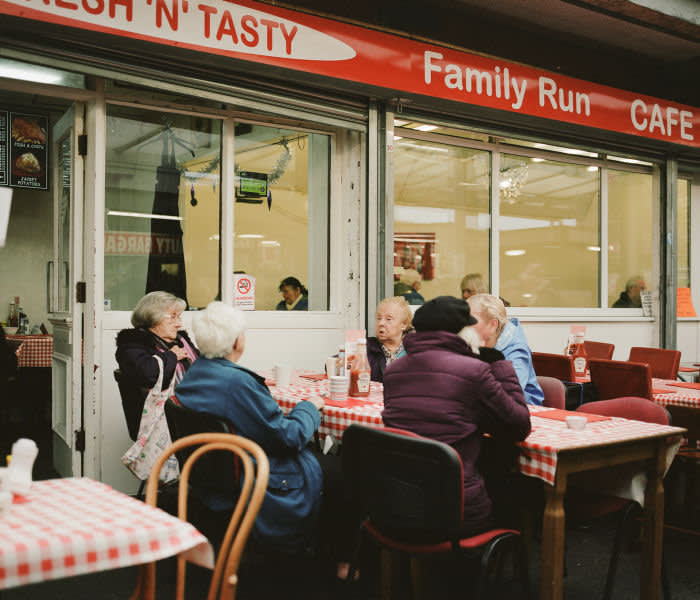The battle for the Brexit-backing north
Will Britain’s election be decided in the Labour heartlands? Matthew Engel reports
by Matthew EngelThere is a region I think of as Fourth Division England. It comprises scattered middle-sized towns whose clubs reside, more often than not, in the Fourth Division of the Football League. This has now been rebranded as League Two, which sounds grander but fools no one: it’s still the Fourth Division.
These towns used to be designated as county boroughs, which gave them a degree of self-government, now lost. They generally also have a railway station, an evening newspaper, a fair-sized Marks and Spencer and usually a Labour MP. They are most heavily concentrated in Lancashire. And they nearly all voted for Brexit.
Of course, none of these criteria are diagnostic. Bury, close to bigger Bolton and massive Manchester, is one of the most typical — but it has never had an evening paper and is no longer connected to the national rail network. There is also a bigger problem: it no longer has a football team.

Last season Bury FC (“The Shakers”) were actually promoted to League One. But their success was fuelled by debt and the club was already on its second successive owner who was, shall we say, underfunded. Last winter, there were rumours of unpaid wages and bills. By August, this had reached crisis point and then they were expelled from the League, an event unseen since 1992.
In front of the locked gates of Gigg Lane, their 134-year-old ground, there is now a display of flags, shirts and scarves, some in white-and-blue Bury colours, others from more fortunate rivals with messages of sympathy and hope. “It’s like a death,” I said to James Frith, Labour MP for Bury North since 2017. “It is a death,” he replied.
This is a gloomy election everywhere. When I met Frith at Gigg Lane, it was 3.30pm and darkening fast. The UK’s last winter election was in late February 1974, but the days were already lengthening with the early daffodils sniffing the air. And this has been a notably cold and rainy November. Nearby, that same night, Conservative aspirant Christian Wakeford finished canvassing and tried texting his wife. The phone slipped out of his frozen hands and smashed, making him uncontactable.
Even the enthusiasts are grumping. “Either your fingers are frozen or it’s so wet the canvass sheets turn to papier-mâché,” said one Labour worker. “In any case it’s so dark you can’t see the sheets. You can’t see the house numbers either. But I have to keep telling the others not to shine their torches to read them in case they terrify the voters.”
The voters, if one answers the door, appear more disengaged than ever. This is Britain’s fifth existentially important vote (three elections, two referendums) in just over five years. In 2017, a TV interviewee known as Brenda from Bristol greeted the news of an election with a yelp of pain: “Not another one!”
It’s worse now. What is striking is not just the role of Brexit in unhinging old allegiances but the way people are determined to vote against the leader they dislike most without knowing who they plan to vote for. Never have the two principals been so distrusted: the feeble opposing strikers in a Fourth Division election.

Boris Johnson, whose most obvious gift is creative wordplay, merely repeats at intervals “Get Brexit Done”, like a semi-skilled budgie. In the current mood, it hits home. No more elections, leave us alone. Maybe the ensuing quiet will be that of the national grave: the impoverishment and dismemberment of the UK. But at a certain stage of sickness anything seems an attractive option.
All discussion exhausted, Brexit is probably talked about now less than at any time in the past four years. It lurks in the background. Wakeford, standing for Bury South, says working-class voters are switching straight to the Conservatives; Frith says potential defectors are flirting more with other options which seem like less of a betrayal.
Both may be right. Britain used to vote in unison, shifting a little one way or the other, a movement that was recorded on election night by a cheery Canadian professor, Bob McKenzie, using a simple pendulum-device known as the swingometer, which could predict with some accuracy which seats would fall. Now the nation is more like a Rubik’s Cube: every constituency different. And some are more different than others.
Bury is a very likeable town. The loss of the railway has been a plus. It has become connected instead to the far more convenient Manchester tram system. It has probably the best market in Britain, with a meat-and-fish hall where produce is displayed with an almost Parisian sensitivity: beef truffles, garlic herb chicken wings, Chinese pork steaks.
The market is also a place for old-fashioned Lancashire warmth, wit and tastes: tripe, cow heel and, above all, black pudding, Bury’s speciality. Last Saturday, there were said to be 25 coaches in the car park from as far away as Wales and Scotland, though the Vegetarian Society might choose elsewhere for an outing.


In 1915, the Bury-based Lancashire Fusiliers fought at Gallipoli, winning “six Victoria Crosses before breakfast”. But more than 1,800 men died over the course of the campaign, and the disaster left its mark for generations. By the time local boy Alistair Burt was 10 years old in the softer times of 1964, he mourned too. But that was because the Shakers had sold their star player, Ray Pointer. They never really recovered.
Bury then was — like the rest of south-east Lancashire — still dependent on the cotton trade. But it considered itself a cut above the neighbours. “It specialised in finishing, preparing the product for sale, which was very highly skilled,” Burt recalls. “So there was more home ownership and the trade unions didn’t have the same grip.”
It did not elect a Labour MP until 1964, and Burt himself won Bury North as a Tory in 1983, holding on for 14 years until Tony Blair’s first landslide. He shifted to a safe seat in Bedfordshire and was a Foreign Office minister until this year. Now, like so many Tory and Labour moderates, he has given up, battle-weary.
Bury is a moderate kind of town: Frith does not mention the name “Corbyn” in his leaflet. He is not local and did not imbibe tales of the Shakers’ FA Cup wins (1900 and 1903) at his father’s knee — he is a southerner, son of a bishop, though you wouldn’t guess that. He is likeable and demotic and has hurled himself into the town with great energy.
On the swingometer, this is an easier seat for the Tories to gain than its companion, Bury South, needing a 4.6 per cent swing against 5.8. But nothing’s that simple any more . . .
It is lunchtime on Friday and the worshippers are heading hurriedly into the Bilal Mosque in Prestwich for prayers. Outside stands a tall, grey-haired man, handing out leaflets and wearing a Jewish yarmulke.
The young brush past him, impatiently not malignly. Others recognise him — he has after all been Bury South’s MP for 22 years — and greet him warmly. “Ivan Lewis,” he says to one man. “Oh, yes. I’ve always been Labour.” There was a pause. “I’m Independent now,” says Lewis. “Ah well. That’s fine,” the man replies, which is not quite a promise of support.

This is Prestwich, one of the three suburbs, along with Whitefield and Radcliffe, that makes up the Bury South constituency. Its connection with the town of Bury is negligible: Prestwich commutes to Manchester on weekdays and looks to United or City at weekends.
Directly opposite the mosque is a kosher butcher. Next door is the Jewish-run Maccabi sports centre that offers its car parking to the mosque-goers on busy days and invites all-comers inside. “Neighbour to neighbour there are some brilliant relationships,” says Lewis. “Community to community less so.”
There was no doubt who was here first: Prestwich has had a strong Jewish presence since the 1930s. This has always been traditional, in a very Anglo-Jewish way: close-knit, strong on support for Israel and marrying within the faith, but outward-looking and unbothered about the finer points of observance. Synagogue on Saturday morning; soccer in the afternoon, that was always the norm. This was Ivan Lewis’s world: he grew up here.
But since then there have been new arrivals, not just the Muslims but a large cohort of ultra-Orthodox Jews, moving out of London to a place where there are affordable large houses for their large families.
Right now the Jewish community is as one. When Jeremy Corbyn, debating Johnson on TV, referred to the late sex offender Jeffrey Epstein, he did so by pronouncing his name with exaggerated foreignness, as Epsh-teen. I winced. Not surprisingly, it struck one Bury South voter, journalist Angela Epstein (no relation). She contacted the Daily Mail.
“I’m used to people calling me Ep-styne rather than Ep-steen. That’s a legitimate mistake. But this sounded to me like a deliberate focus on the Jewishness of the name, as though he was saying, ‘Oh, and by the way he was Jewish, in case you hadn’t noticed.’ ”

Lewis’s position is complicated. Under Tony Blair, he was a rising Labour star; had Ed Miliband won in 2015, he was in line for the cabinet. He was never going to flourish under Corbyn. But there had already been a suggestion of sexual harassment and another followed. Labour suspended Lewis pending investigation in 2017; a year later, there had been no hearing but he remained suspended, so he quit the party. He denies the allegations, which have not involved the police, and claims the delay was vindictive.
This September he wore a yarmulke in the Commons (believed to be a parliamentary first) to denounce Corbyn for turning Labour into a party of “institutionalised anti-Semitism”. But he’s still standing, against the new Momentum-backed Labour candidate, Lucy Burke. “I still think I’ve got a lot to offer. Other people have been driven out. I’m not being driven out.” He is 52, not an easy age to become an ex-MP.
In the 1960s there were about 40 Jewish MPs and only two were Tories; Labour was the party of refuge. As British Jews felt more secure, the balance evened up. “Jews voted the same way as anyone else,” says Epstein. “For the party who spoke to them and their needs. This time I have not met a single Jewish person voting Labour.”

Clearly, many will vote for Lewis. He may well achieve the Samsonesque feat of bringing down the temple on both him and his enemies, which would be appropriately biblical, letting in the Conservative, Christian Wakeford, who, it can safely be said, is neither Jewish nor Muslim.
I met Wakeford, once his phone was fixed, in a coffee shop. He is semi-local: 35, earnest, an insurance broker and Tory group leader on Pendle Council in central Lancashire. He is a great believer in Johnson: “I trust him.”
“But he tells lies?”
“This is my inner geek coming out. My favourite quote in all Star Wars is from Obi-Wan.” Wakeford’s version was not quite the one quoted on the web. (But, hey, this is politics, 2019.) This goes: “You’ll find that many of the truths we cling to depend greatly upon our own point of view.”
He will fit nicely into a Johnson-led parliament. I dare not tell him that many Prestwich Jewish mothers would regard the prime minister as the definition of a lobbus, ie a yob and slob, not someone you would choose as a son-in-law.
The Bury North seat heads way out of the town itself, through open countryside to reliably Tory Tottington and the old mill town of Ramsbottom, the epitome of a Lancashire joke town: the long line of Lancastrian comics could always get a laugh just by saying the word.
But this place has changed. In the 1980s, a lot of detached houses were built on the outskirts, at much cheaper prices than in the old-money suburbs of south Manchester and Cheshire. That may have increased the Tory vote. But 20 years later came another influx of newer, leftier voters — many employed by the BBC. James Frith now hopes it will help him.
It was always, beneath the industrial grime, an attractive stone-built moorside settlement with plenty of shops. Those shops, however, have also been transformed. Ramsbottom has become a destination. “Rammy’s suddenly become the place to go,” says Bury journalist Michael Crutchley. “That means they’ve rebranded the pizza places as Italian restaurants serving the same food for twice as much.”
More than that, it has fancy stores, many of them named to incorporate the newly fashionable locale: “Lacy Days of Ramsbottom” (bridal); “Desire Salon Ramsbottom” (nails); “Caravaggio of Ramsbottom” (furniture). There is only one butcher left, no newsagent near the centre, no greengrocer, fishmonger — or bank. There were three a couple of years back; the last closed in June.
This is a familiar pattern in small towns across Britain. It has had, so I was told in Ramsbottom, consequences, not all predicted. Footfall has fallen, because many older people distrust online banking and head for a town that still has branches. And the tradespeople have to drive elsewhere to deposit cash.
So sometimes they don’t: they pay their suppliers in cash. Who loses? The banks. If Britain had a fully functioning government, which it has not had since the Brexit referendum, a minister would have called the bankers in and cajoled them to set up flexible systems to allow one branch to serve everyone in such towns. Nothing was done. Business-to-business cash payments are obviously less transparent. So who else loses? The government. The classic insanity of a Fourth Division country.
If the polls are right and the Tories win big, Britain will soon have a majority government again but at the expense of a diverse, questing, independently minded parliament. Creative thinking is improbable.
Frith’s survival will be a benchmark. If he wins, he will be much involved in setting up a “phoenix” club under new ownership to replace Bury FC and start again from some lowly division to find a way of winning again. If he falls, with dozens of others across the north, there will have to be a phoenix Labour party. And many of its own longstanding fans will welcome that too.
Matthew Engel is author of ‘Engel’s England: Thirty-nine Counties, One Capital and One Man’ (Profile)
Follow @FTLifeArts on Twitter to find out about our latest stories first. Listen and subscribe to Culture Call, a transatlantic conversation from the FT, at ft.com/culture-call or on Apple Podcasts